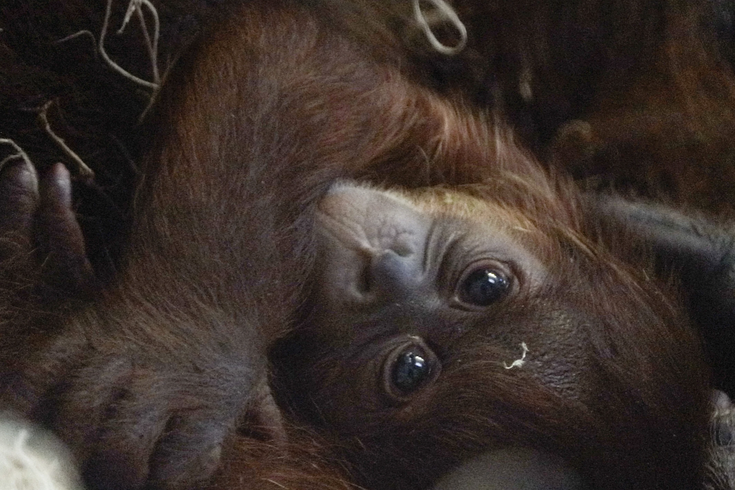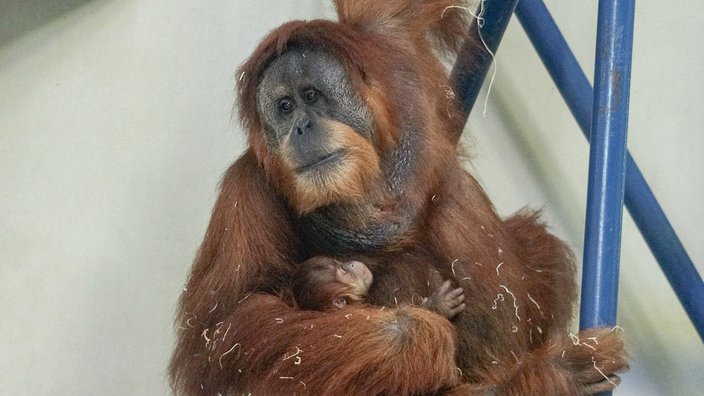
July 11, 2024
 Provided Image/Philadelphia Zoo
Provided Image/Philadelphia Zoo
A baby Sumatran orangutan was born in June at the Philadelphia Zoo. It's the first of the critically endangered species to be born here since 2009.
For the first time in 15 years, the Philadelphia Zoo welcomed the birth of a Sumatran orangutan. The critically endangered species is part of a breeding program among zoos intended to ensure the survival of species at risk of extinction.
The infant orangutan was born in late June to 31-year-old female Tua and 28-year-old male Sugi, who live at the zoo's primate preserve. Zoo staff said they haven't yet determined the gender of the baby, who's unnamed for the time being.
MORE: John Dougherty, former Philly labor union boss, sentenced to 6 years in prison
“It is a joy to be able to share this wonderful news with the greater Philadelphia region and the world,” Rachel Metz, the zoo's vice president of animal well-being and conservation, said Thursday. “This critically endangered species is rapidly losing habitat largely due to deforestation as a result of an increased demand for logging, palm oil, and other natural resources located in their habitats."
The species is native to the forests of Sumatra, part of the Sunda Islands of western Indonesia. They're one of three species of orangutans, who are the only members of the great ape family to spend most of their time off the ground. They use their long and muscular arms to scale trees and have a diet that consists mainly of fruit, bark and vegetation. They are considered among the planet's most intelligent non-human species, with recent research suggesting they're capable of communicating about past experiences to warn each other about predators.
It's estimated that fewer than 14,000 Sumatran orangutans remain in the wild. The birth of the orangutan in Philadelphia is part of the Species Survival Plan of the Association of Zoos and Aquariums, which strives to maintain genetically diverse populations of threatened animals.
 Provided Image/Philadelphia Zoo
Provided Image/Philadelphia ZooTua, a Sumatran orangutan, is shown carrying her baby at the Philadelphia Zoo after giving birth in late June.
The Philadelphia Zoo was the world's first to successfully breed orangutans in 1928. There have been 20 born at the zoo since then.
Tua last gave birth in 2009 to a female, Batu, who remained with her parents at the Philadelphia Zoo through 2021. She has since been paired with a male at Woodland Park Zoo in Seattle and is now expecting a baby of her own. Orangutans have an eight-month gestation period. Babies nurse from their mothers for up to six years, but often start to eat solid food at around four months. They reach adolescence between the ages of 7 and 10.
Tua is now bonding with her baby in their indoor habitat at the primate preserve, where they have the choice to enter an area visible to guests or spend time alone in their bedroom. Sugi will be given a chance in the future to reunite with the pair. In the wild, males typically don't raise their young. Orangutans are usually solitary in the wild but can be social with their peers.
The zoo is planning to hold a dedicated public debut for the baby orangutan in August. Details on the celebration will be released in the near future.
“Our entire zoo community and those that work closest with our orangutans are thrilled to watch Tua become a mother again and watch this baby grow,” said Michael Stern, the zoo's curator of primates and small mammals.